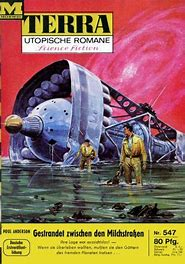"What a spaceship captain fears most...is arriving in the same place as a solid body. Then atoms jam together and the ship goes out in a massive explosion." (Poul Anderson, World Without Stars, New York, 1966, p. 27)
Wells' "fantastic and imaginative romances" were the forerunners of much later science fiction. In these extracts, both Wells and Anderson allude to an explosion, "...far-reaching..." or "...massive...," caused by the jamming together of particles. Anderson's account is briefer, more direct and prosaic. Wells' account of "time travelling" combines Bradbury-like poetic prose with Andersonian scientific rationalization.
I think Dr Who's TARDIS once occupied the same space as another body and was blown onto a blank screen where the Time Lord met the god of time, Chronos? Wells merely hints with his suggestion of going outside all possible dimensions "...into the Unknown."

No comments:
Post a Comment